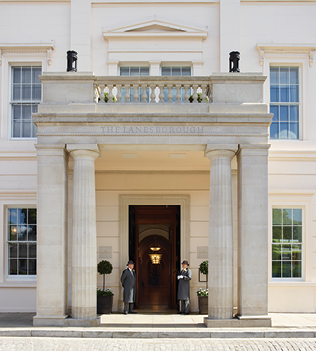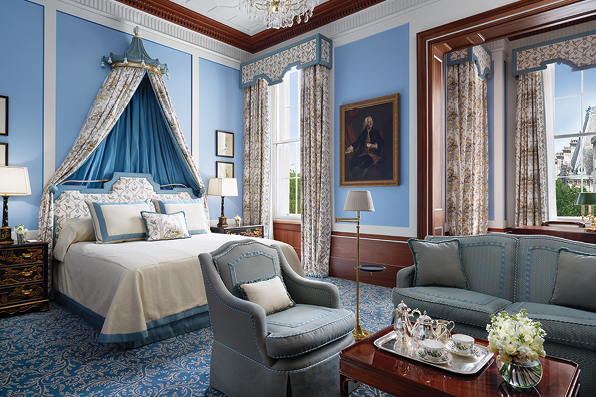- Home
- Media Kit
- Current Issue
- Past Issues
- Ad Specs-Submission
- Ad Print Settings
- Reprints (PDF)
- Photo Specifications (PDF)
- Contact Us

![]()
ONLINE

An English Touch
Editors’ Note
Geoffrey Gelardi, a fourth-generation hotelier, previously served as Managing Director of Hotel Bel-Air in Los Angeles. In 1990, he assumed his post at The Lanesborough.
Property Brief
The Lanesborough (lanesborough.com) occupies an 1827 landmark building that was restored to its original grandeur. Part of the prestigious Oetker Collection, the five-star ultra-deluxe property is situated on London’s Hyde Park Corner and offers guests 93 guest rooms including 43 suites to choose from, decorated in Regency style and evoking the ambience of a 19th-century townhouse. The property is located in elegant Knightsbridge, minutes from the exclusive shopping of Harrods and Sloane Street. Guests will enjoy dining at Céleste, which received its first Michelin star in October 2016. The Lanesborough also offers award-winning Afternoon Tea, cocktails at the Library Bar, and an extensive array of vintage cognacs dating back to 1770. The property houses the most luxurious cigar bar in London, The Garden Room, while Spring 2017 will see the opening of The Lanesborough Club & Spa, London’s most luxurious members club and spa.

The Lanesborough entrance
Is it challenging today within the London market and is there growth for a property like The Lanesborough?
The market is tough everywhere in the world right now and London is no different. Some of the major cities in the U.S. and Europe are showing substantial declines for different reasons, but London has remained stable overall.
It can be volatile on a week to week basis, but overall the market is relatively stable. We need to see what Brexit does to us – so far for our industry, it has been a positive thing in that the exchange rate is very favorable for Europeans and Americans visiting London.
Once again, it’s a cloudy view of the economic future mainly because we really don’t know what exiting the EU is going to bring to us from a business perspective; it very much depends on the conditions of exit from the EU.
You reopened the hotel after a major transformation. Coming out of that type of effort, there is an expectation for the property. Now that the guests have returned, has the reception for the product been what you had hoped?
The acceptance of the product has been exceptional and as part of the Oetker Collection, we have opened up and developed new markets we didn’t have before. This, coupled with the assistance of a strong marketing team, and now being part of Leading Hotels of the World again, means we are looking at some substantial growth in the not too distant future.

An executive junior suite
Do you worry about oversupply in the London market?
London is still one of the best hotel markets in the world, with new projects opening up around us all the time. It’s such a strong market but it very much depends on how the British economy does. This end of the market relies heavily on the economy and on banking, finance, and consultancy, as well as the entrepreneurial sector. As long as the economy thrives, there is space for additional hotels in London. There will come a point where there are too many, but for now I don’t think we’ve reached that point.
For The Lanesborough, does differentiation still come from service and the people aspect or can you differentiate around product as well?
In differentiating one hotel from another, people look for different things and I hope The Lanesborough has a specific niche market that encompasses a number of areas.
One is the personal service that we strive to provide. It also has to do with the technology that we offer today – we have to have a great technology product, yet it must be unobtrusive.
If we look at what we did in the renovation and at the detail of the finishes of the product, I’ve never seen another hotel with the detail in the design that we have throughout the hotel. However, many people won’t even notice that and will be much more interested in the personal butler service or the residential feel of the hotel.
We try to be everything to everyone but we can’t. Some people look for individuality of hotels, others like the consistency of a particular brand, some people want the taste of the city they’re visiting and, hopefully, The Lanesborough gives an English touch to everything we do. We still try to make it as residential as possible. We still don’t have any shops in The Lanesborough and we try to welcome everybody in the main hall instead of from behind a desk.
Another point of difference that guests like is that we also try not to nickel-and-dime them. We’re the only hotel in London that gives complimentary phone calls to the U.S. and Europe; we also include all the movies on the TV in the rate – there is no extra charge.
Some of the things we’ve done for years are appreciated and are still considered a point of difference.
As part of the hotel’s reopening, you introduced Céleste restaurant. Have you been happy with how it has been received and is it presented more as a restaurant for the local community?
We certainly try to attract the local market – that is a critical part of any successful restaurant. We got our first Michelin star recently and we’re very proud of that.
Céleste is proving to be successful. Eric Frechon from Le Bristol oversees it for us. He has brought in his executive sous chef from the Bristol, Florian Favario, as our Executive Chef, and they have done a terrific job in acquiring the star so quickly. I’m sure that Céleste will continue to improve its popularity as we go forward.
Do you try to bring Oetker in as part of telling the brand story or is the focus primarily on The Lanesborough?
For the first time, we have a brand partner that is synonymous with the style of hotel. The other Oetker hotels are all spectacular in their own right and it’s difficult to find another hotel company that has the selection of hotels that are of such high quality. It’s a great association.
We exchange guests with Le Bristol and Hotel du Cap, for example, and that perspective helps make it a great association.
Which characteristics are essential to succeeding in this business?
One has to enjoy being in the business and serving people. Making people happy is the most important part of this industry.
Good hoteliers are well-rounded, financially sound, good businesspeople, and understand what people want. They stay close to their customers and their staff to make sure to keep a finger on the pulse of the business.•